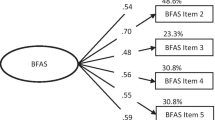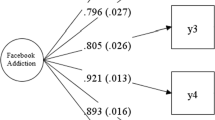Abstract
This study used the psycho-structural taxonomy proposed by King et al. (International Journal of Mental Health and Addiction, 8(1), 90–106, 2010a) to examine the structural characteristics of two genres of Facebook games (Tile Matching games and Simulation/RPGs) to investigate their potential to encourage and maintain Problem Video Game Play (PVGP). Ten of the most popular Facebook games were played by the first author for between two and three hours per game. Recurring structural characteristics influencing the researcher’s behaviour or considered to be problematic were noted and compiled according to the taxonomy. Both genres appeared to have the capacity to encourage the development and maintenance of PVGP. While Simulation/RPGs appear to promote more problematic use than do Tile Matching games, both tended to use similar features to promote player engagement. Further in-depth research is needed to understand the psychological impact of playing Social Network Games, and how this may lead to, or encourage problematic use of these games.
Similar content being viewed by others
References
American Psychiatric Association. (2013, May). Internet gaming disorder, retrieved from http://www.dsm5.org/Documents/Internet Gaming Disorder Fact Sheet.pdf
Caplan, S., Williams, D., & Yee, N. (2009). Problematic internet use and psychosocial well-being among MMO players. Computers in Human Behavior, 25(6), 1312–1319. doi:10.1016/j.chb.2009.06.006.
Chase, H., & Clark, L. (2010). Gambling severity predicts midbrain response to near-miss outcomes. The Journal of Neuroscience, 30(18), 6180–6187. doi:10.1523/JNEUROSCI.5758-09.2010.
Chen, K. H., Shen, K. S., & Ma, M. Y. (2012). The functional and usable appeal of Facebook SNS games. Internet Research, 22(4), 467–481. doi:10.1108/10662241211250999.
Clark, L., Crooks, B., Clarke, R., Aitken, M. R., & Dunn, B. D. (2011). Physiological responses to near-miss outcomes and personal control during simulated gambling. Journal of Gambling Studies, 28, 123–137.
Collins, E., & Freeman, J. (2013). Do problematic and non-problematic video game players differ in extraversion, trait empathy, social capital and prosocial tendencies? Computers in Human Behaviour, 29(5), 1933–1940. doi:10.1016/j.chb.2013.03.002.
Cote, D., Caron, A., Aubert, J., & Ladouceur, R. (2003). Near wins prolong gambling on a video lottery terminal. Journal of Gambling Studies, 19, 380–407.
Deci, E. L., & Ryan, R. M. (2000). The ‘what’ and ‘why’ of goal pursuits: human needs and the self-deterination of behavior. Psychological Inquiry, 11, 227–268.
Elliott, L., Golub, A., Ream, G., & Dunlap, E. (2012). Video game genre as a predictor of problem use. Cyberpsychology, Behavior and Social Networking, 15(3), 155–216. doi:10.1089/cyber.2011.0387.
Fisher, S., & Griffiths, M. D. (1995). Current trends in slot machine gambling: research and policy issues. Journal of Gambling Studies, 11, 239–247. doi:10.1007/BF02104791.
Gentile, D. A., Swing, E. L., Lim, C. G., & Khoo, A. (2012). Video game playing, attention problems, and impulsiveness: evidence of bidirectional causality. Psychology of Popular Media Culture, 1(1), 62–70. doi:10.1037/a0026969.
Griffiths, M. D. (1990). Psychobiology of the near-miss in fruit machine gambling. The Journal of Psychology, 125, 347–357.
Haagsma, M. C., Pieterse, M. E., & Peters, O. (2012). The prevalence of problematic video gamers in the Netherlands. Cyberpsychology, Behavior and Social Networking, 15(3), 162–168. doi:10.1089/cyber.2011.0248.
Hayes, T. (2008). Jump point: How network culture is revolutionizing business. 1st edition. McGraw-Hill.
Hill, J. (2007). Ethical dilemmas. Sydney Morning Herald: Digital Life, September 20th, 2007, http://www.smh.com.au/news/articles/ethical-dilemmas/2007/09/19/1189881577195.html
Hsu, S. H., Wen, M. H., & Wu, M. C. (2009). Exploring user experiences as predictors of MMORPG addiction. Computers & Education, 53(3), 990–999. doi:10.1016/j.compedu.2009.05.016.
Karlsen, F. (2010). Entrapment and near miss: a comparative analysis of psycho-structural elements in gambling games and Massively Multiplayer Online Role-Playing Games. International Journal of Mental Health and Addiction, 9(2), 193–207. doi:10.1007/s11469-010-9275-4.
Kim, E. J., Namkoong, K., Ku, T., & Kim, S. J. (2008). The relationship between online game addiction and aggression, self-control and narcissistic personality traits. European Psychiatry: The Journal of the Association of European Psychiatrists, 23(3), 212–220. doi:10.1016/j.eurpsy.2007.10.010.
King, D. L., & Delfabbro, P. H. (2009). Motivational differences in problem video game play. Journal of Cybertherapy and Rehabilitation, 2(2), 139–149.
King, D. L., Delfabbro, P. H., & Griffiths, M. D. (2010a). Video game structural characteristics: a new psychological taxonomy. International Journal of Mental Health and Addiction, 8(1), 90–106. doi:10.1007/s11469-009-9206-4.
King, D. L., Delfabbro, P. H., & Griffiths, M. D. (2010b). The role of structural characteristics in Problematic Video Game Play: an empirical study. International Journal of Mental Health and Addiction, 9(3), 320–333. doi:10.1007/s11469-010-9289-y.
King, D. L., Delfabbro, P. H., & Griffiths, M. D. (2010c). The role of structural characteristics in Problematic Video Game Play: a review. Cyberpsychology: Journal of Psychosocial Research on Cyberspace, 4(1), Article 6. http://cyberpsychology.eu/view.php?cisloclanku=2010041401&article=6
King, D. L., Haagsma, M. C., Delfabbro, P. H., Gradisar, M., & Griffiths, M. D. (2013). Toward a consensus definition of pathological video-gaming: a systematic review of psychometric assessment tools. Clinical Psychology Review, 33(3), 331–342. doi:10.1016/j.cpr.2013.01.002.
Ko, C.-H., Yen, J.-Y., Chen, C.-C., Chen, S.-H., & Yen, C.-F. (2005). Gender differences and related factors affecting online gaming addiction among Taiwanese adolescents. The Journal of Nervous and Mental Disease, 193(4), 273–277. doi:10.1097/01.nmd.0000158373.85150.57.
Kuss, D. J., & Griffiths, M. D. (2011). Internet gaming addiction: a systematic review of empirical research. International Journal of Mental Health and Addiction, 10(2), 278–296. doi:10.1007/s11469-011-9318-5.
Kuss, D. J., Louws, J., & Wiers, R. W. (2012). Online gaming addiction? Motives predict addictive play behavior in massively multiplayer online role-playing games. Cyberpsychology, Behavior and Social Networking, 15(9), 480–485. doi:10.1089/cyber.2012.0034.
Lee, J., Lee, M., & Choi, I. H. (2012). Social network games uncovered: motivations and their attitudinal and behavioral outcomes. Cyberpsychology, Behavior and Social Networking, 15(12), 643–648. doi:10.1089/cyber.2012.0093.
Lemmens, J. S., Valkenburg, P. M., & Peter, J. (2009). Development and validation of a game addiction scale for adolescents. Media Psychology, 12(1), 77–95. doi:10.1080/15213260802669458.
Li, D., Liau, A., & Khoo, A. (2011). Examining the influence of actual-ideal self-discrepancies, depression, and escapism, on pathological gaming among Massively Multiplayer Online Adolescent Gamers. Cyberpsychology, Behaviour and Social Networking, 14(9), 535–539. doi:10.1089/cyber.2010.0463.
Macmillan, D., & Stone, B. (2011). Zynga’s little known addiction: “whales”. Bloomberg Business Week, July 11–July 17, 37–38.
Maiberg, E. (2013). Top 25 Facebook games of May 2013, retrieved from http://www.insidesocialgames.com/2013/05/01/the-top-25-facebook-games-of-may-2013/
Mehroof, M., & Griffiths, M. D. (2010). Online gaming addiction: the role of sensation, seeking, self-control, neuroticism, aggression, state anxiety, and trait anxiety, cyberpsychology. Behaviour and Social Networking, 13(3), 314–316.
Mentzoni, R. A., Brunborg, G. S., Molde, H., Myrseth, H., Skouverøe, K. J. M., Hetland, J., et al. (2011). Problematic video game use: estimated prevalence and associations with mental and physical health. Cyberpsychology, Behavior and Social Networking, 14(10), 591–596. doi:10.1089/cyber.2010.0260.
Montag, C., Flierl, M., Markett, S., Walter, N., Jurkiewicz, M., & Reuter, M. (2011). Internet addiction and personality in First-Person-Shooter video gamers. Journal of Media Psychology: Theories, Methods, and Applications, 23(4), 163–173. doi:10.1027/1864-1105/a000049.
Ng, B. D., & Wiemer-Hastings, P. (2005). Addiction to the internet and online gaming. Cyberpsychology & Behavior : the Impact of the Internet, Multimedia and Virtual Reality on Behavior and Society, 8(2), 110–113. doi:10.1089/cpb.2005.8.110.
Peters, C. S., & Malesky, L. A. (2008). Problematic usage among highly-engaged players of massively multiplayer online role playing games. Cyberpsychology & Behavior: the Impact of the Internet, Multimedia and Virtual Reality on Behavior and Society, 11(4), 481–484. doi:10.1089/cpb.2007.0140.
Rehbein, F., Kleimann, M., & Mössle, T. (2010). Prevalence and risk factors of video game dependency in adolescence: results of a German nationwide survey. Cyberpsychology, Behavior and Social Networking, 13(3), 269–277. Retrieved from http://www.ncbi.nlm.nih.gov/pubmed/20557246.
Tversky, A., & Kahneman, D. (1974). Judgment under uncertainty: heuristics and biases. Science, 185(4157), 1124–1131. doi:10.1126/science.185.4157.1124.
Vorderer, P., Hartmann, T., & Klimmt, C. (2003). Explaining the enjoyment of playing video games: the role of competition, ICEC ’03 Proceedings of the Second International Conference on Entertainment Computing, 1–9.
Walther, B., Morgenstern, M., & Hanewinkel, R. (2012). Co-occurrence of addictive behaviours: personality factors related to substance use, gambling and computer gaming. European Addiction Research, 18(4), 167–174. doi:10.1159/000335662.
Wang, H., & Sun, C. T. (2011). Game reward systems: gaming experiences and social meanings. Proceedings of DiGRA 2011 Conference: Think Design Play, 1–12.
Wohn, D. Y., & Lee, Y.-H. (2013). Players of facebook games and how they play. Entertainment Computing, 4(3), 171–178. doi:10.1016/j.entcom.2013.05.002.
Wood, R. T. A. (2008). Problems with the concept of video game “addiction”: some case study examples. International Journal of Mental Health Addiction, 6, 169–178. doi:10.1007/s11469-007-9118-0.
Wood, R. T. A., Griffiths, M. D., Chappell, D., & Davies, M. N. O. (2004). The structural characteristics of video games: a psycho-structural analysis. Cyberpsychology & Behavior: the Impact of the Internet, Multimedia and Virtual Reality on Behavior and Society, 7(1), 1–10. doi:10.1089/109493104322820057.
Wu, P. C. (2013). Addictive behaviour in relation to the happy farm application. Social Behaviour and Personality, 41(56), 539–554.
Zanetta Dauriat, F., Zermatten, A., Billieux, J., Thorens, G., Bondolfi, G., Zullino, D., et al. (2011). Motivations to play specifically predict excessive involvement in massively multiplayer online role-playing games: evidence from an online survey. European Addiction Research, 17(4), 185–189. doi:10.1159/000326070.
Author information
Authors and Affiliations
Corresponding author
Rights and permissions
About this article
Cite this article
Groves, S.J., Skues, J.L. & Wise, L.Z. Assessing the Potential Risks Associated with Facebook Game Use. Int J Ment Health Addiction 12, 670–685 (2014). https://doi.org/10.1007/s11469-014-9502-5
Published:
Issue Date:
DOI: https://doi.org/10.1007/s11469-014-9502-5




